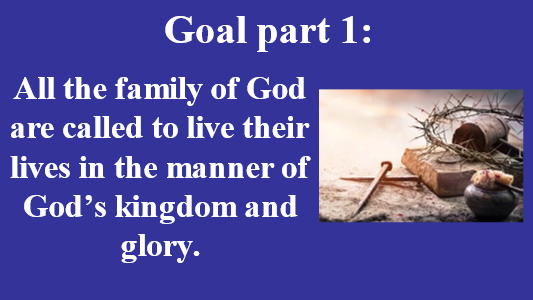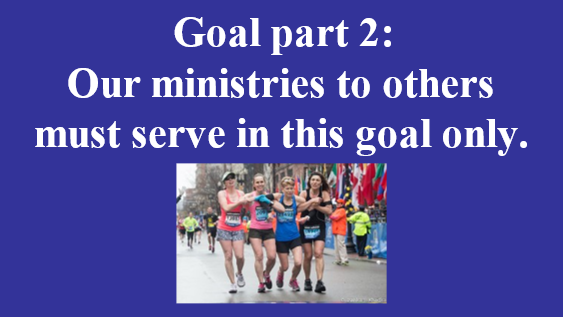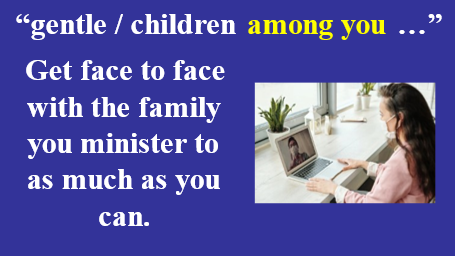1 Thess 2:5-12 – Assisting the royal family to live in a way worthy of God.
length: 82:18 - taught on Mar, 26 2023
Class Outline:
Sunday March 26, 2023
A family of love with Christ as the Head and the members loving and serving one another. God longs for this in the church.
Theme of Thessalonians: Encouraging one another through divine love and service to walk in a manner worthy of God.
Subtheme (chapter 2): Assisting the royal family to walk in a manner worthy of God who called them.
Paul will emphasize that we are family and we are assisting our family; father, mother, brother, sister, children to succeed in the only way that matters.
This goal is at the end of this passage (2:5-12):
so that you would walk in a manner worthy of the God who calls you into His own kingdom and glory.
This is where we will start and finish today.
Walk is used in the New Testament epistles as a metaphor for living, which particular emphasis on conduct and manner. It is equivalent to the OT phrase, “when you come in and go out,” as in “in and out your door.”
“Blessed shall you be when you come in, and blessed shall you be when you go out.”
This gets to the heart of Paul’s letter; “so that you would live out your lives in a manner worthy of the God who calls you…”
The plural “you” refers to the entire body of Christ, without exception.

Goal part 1:
All the family of God are called to live their lives in the manner of God’s kingdom and glory.
We have to come to know what that is. What it is, the manner of the kingdom and God’s glory, is not hidden. It is splashed all over the NT. You would have to not know the Scripture to miss it. Paul is going to show it here as well.

Goal part 2:
Our ministries to others must serve in this goal only.
Whatever we do in the service of other members of the body of Christ can only be directed toward this goal. This goal will keep your service of others focused and effective. God has made us new and as the new humanity in Christ we have a desire to help and serve others. When we know the particular goal we are helping them towards, we will be truly effective.
Our relationships to others.
Paul presents four roles (1TH 2:5-11):
Imposter, gentle (or child), mother, father.
One of the repeated words that Paul uses in this passage is “come” or really “become” in reference to himself and Timothy and Silas.
Ginomai is what you are or what you become.
For we never came with flattering speech
[Paul here is not talking about his arrival, but who he and his were in character]
But we proved to be gentle (or children)
how devoutly and uprightly and blamelessly we behaved toward you believers;
Proved and behaved are fine translations of this versatile word, but we want to see the connection that Paul is using. We were never of this kind of people, but we were of that kind.
The impostor:
The impostor wants in the family.
He can do nothing alone (or with other liars).
He is a false teacher.
Of the four roles, you notice that three are a part of a family unit while the first is not.
So our first role is that of the impostor. We saw him last class.
Paul states that he never was the impostor. He was in fact approved by God and entrusted with the gospel by God in vs. 4.
For we never came with flattering speech, as you know, nor with a pretext for greed — God is witness — 6 nor did we seek glory from men, either from you or from others, even though as apostles of Christ we might have asserted our authority.
“I know that after my departure savage wolves will come in among you, not sparing the flock; 30 and from among your own selves men will arise, speaking perverse things, to draw away the disciples after them.”
They bless with their mouth,
But inwardly they curse. Selah.
Impostor:
Flattery
Cloak of good over his greed
Seeks glory of men
Not one church in the NT was spared from false doctrine, of which it seems that in most of them the lie came from among their own people. It is what bothered Paul the most, even more than the physical sufferings he endured. Still, Paul knew something that kept him going and showed him the way of continuing to minister effectively to the church in the midst of so much opposition, when most would have quit.
What did Paul become?
Child or gentle? - nepioi- child
epioi - gentle
[each one is found in several manuscripts]
But we proved to be gentle among you,
We can go with both. If he meant “child,” he meant humble servant. If he meant “gentle” then he meant something very similar.

“gentle / children among you …”
Get face to face with the family you minister to as much as you can.
Fallen humanity has a tendency to isolate. Our sinful natures push us into exile from others. We have seen the harm that isolation and mask wearing has done over the pandemic. God perfectly fit the body of Christ together. We are not made for isolation from one another.
we are to grow up in all aspects into Him who is the head, even Christ, 16 from whom the whole body, being fitted and held together by what every joint supplies, according to the proper working of each individual part, causes the growth of the body for the building up of itself in love.
One of the reasons for commentators to prefer “gentle” is that Paul’s next metaphor rapidly switches his role.
But we proved to be gentle among you, as a nursing mother tenderly cares for her own children. 8 Having so fond an affection for you, we were well-pleased to impart to you not only the gospel of God but also our own lives, because you had become very dear to us.
The picture now is Paul as a nursing mother who tenderly cares for her own children.
Paul uses a very strong word for care.
Thalpo - cherish with tender love.
And like the infant does not know how much the mother loves him, so many of Paul’s listeners had no idea how much he loved them, just in this way. The depth of love that a parent has for their child is not reciprocated until the child is mature enough to understand it, and to understand it, they must have it in themselves.
Christ loves His church in this way.
He who loves his own wife loves himself; 29 for no one ever hated his own flesh, but nourishes and cherishes it, just as Christ also does the church, 30 because we are members of His body.
So also the husbands are to love their wives in this same way. It is as strong a love as a nursing mother has for her infant. If Christ cherishes the church with tender love and the husband is to love his wife as Christ does the church …
And, we are to have this love for the unbeliever and the believer.
But we proved to be gentle among you, as a nursing mother tenderly cares for her own children. 8 Having so fond an affection for you, we were well-pleased to impart to you not only the gospel of God but also our own lives, because you had become very dear to us.
Since he is imparting the gospel, he must mean that his care for them was of this quality before they believed it and after.
We have the gentleness of a child, the cherishing tender love of the mother, and then we have the father.
just as you know how we were exhorting and encouraging and imploring each one of you as a father would his own children,
If we fail, we don’t stop being fathers to others.
In Greek Paul emphasizes the position of father over what the father is to do. The Greek word order of this clause is: “Each one of you as a father his children …” and then Paul adds the participles exhorting, encouraging, and imploring.
Role of the father to others:
Exhortation (parakaleo - comfort)
Encourage (console, speak soothingly)
Implore (marturomai - witness, testify)
Which role would you prefer?
Which role did Paul take?
Paul accepted all three roles: the gentle humble child, the tender loving caring mother, and the exhorting, encouraging, teaching (modeling) father.
We are each going to need to be on of the three at various times, depending upon what others need, and never upon what we need.
You might have noticed that we skipped over a section, vv. 9-10.
Though we must take on the different roles in the family, the virtuous behavior of each role is the same. God’s virtue is the same for all, even though the manifestation of each role is different.
For you recall, brethren, our labor and hardship, how working night and day so as not to be a burden to any of you, we proclaimed to you the gospel of God. 10 You are witnesses, and so is God, how devoutly and uprightly and blamelessly we behaved toward you believers;
Behavior of father, mother, gentle child:
Toil and painful labor.
Work night and day (not 24 hrs.)
Not a burden
Devout - (Greek) pure from evil
Upright - righteous
Blameless.
And all of that …so that:
so that you would walk in a manner worthy of the God who calls you into His own kingdom and glory.





